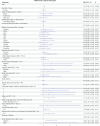The hidden impact: social isolation and inflammation's role in pancreatic cancer risk among those with diabetes
- PMID: 39794805
- PMCID: PMC11720300
- DOI: 10.1186/s12885-025-13470-z
The hidden impact: social isolation and inflammation's role in pancreatic cancer risk among those with diabetes
Abstract
Background: Pancreatic cancer poses a significant challenge in individuals with diabetes, prompting a reevaluation of established risk factors beyond conventional glycemic control measures.
Objectives: To explore the complex interplay of metabolic and psychosocial determinants in pancreatic cancer risk among individuals with diabetes, challenging prevailing perspectives and advocating for a comprehensive approach.
Methods: A total of 21,945 UK Biobank participants with baseline diabetes diagnosis were analyzed. Social isolation was assessed through a questionnaire capturing five factors: household size, social activities, friend/family visits, loneliness, and confiding in others. Incident pancreatic cancer was identified using ICD codes. Baseline characteristics, insulin use, and other relevant factors were analyzed. Hazard ratios and mediation analyses were conducted to determine the relationship between social isolation, inflammation, and pancreatic cancer risk.
Results: Individuals with high social isolation were more likely to be male, smokers, non-drinkers, and have shorter sleep duration. They also had an increased risk of pancreatic cancer (HR = 2.65, 95% CI = 1.12-6.24) compared to those with low social isolation. Mediation analyses highlighted inflammation as a crucial mediator, with the proportion mediated by inflammation being 19.44% for insulin use, 10.34% for smoking, and 8.33% for social isolation.
Conclusions: Our findings highlight the importance of psychosocial factors in pancreatic cancer risk and underscore the need for further research to elucidate the underlying mechanisms.
Keywords: Diabetes mellitus; Isolation; Loneliness; Pancreatic neoplasms; Psychosocial.
Plain language summary
1. We explored the complex interplay of metabolic and psychosocial determinants in pancreatic cancer risk among diabetic patients. 2. High levels of social isolation increase the risk of pancreatic cancer in diabetes. 3. Inflammation was identified as an important mediator in the relationship between social isolation and pancreatic cancer risk among people with diabetes.
© 2025. The Author(s).
Conflict of interest statement
Declarations. Ethics approval and consent to participate: The experimental protocol was established, according to the ethical guidelines of the Helsinki Declaration, UK Biobank data has approval from the North West Multi-centre Research Ethics Committee (MREC) (REC reference: 21/NW/0157). This research has been conducted with the UK Biobank Resource under project 95180. Written informed consent was obtained from individual or guardian participants. Consent for publication: All data of UK Biobank has been completed and approved with participant consent and release consent. Competing interests: The authors declare no competing interests.
Figures
References
MeSH terms
Grants and funding
LinkOut - more resources
Full Text Sources
Medical



